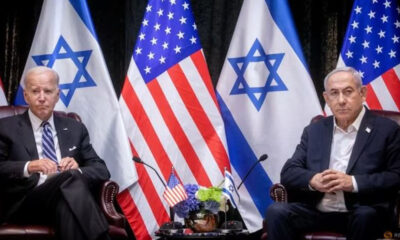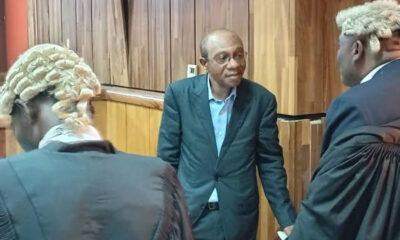Business
CBN governor, bank chiefs on a collision course over amount of new notes

The cash crunch that hit most banks in the country since Monday, January 30, 2023 continued yesterday as banks said they had not been getting enough cash from the Central Bank of Nigeria (CBN) to disburse to their customers.
Consequently, the Association Senior Staff of Banks Insurance and Financial Institutions (ASSBIFI) has challenged the Central Bank of Nigeria (CBN) to make public how much new naira notes it had pushed into circulation, even as it expressed worry over the scarcity of new and old naira notes in the country.
The president of ASSBIFI, Comrade Olusoji Oluwole, lamented that Nigerians are going through excruciating difficulties in order to feed and do business transactions because of the cash crunch brought by the policy. He called for a review of the policy in order to save Nigerians from further hardship.
Oluwole urged the CBN to publicly declare how much of the new Naira notes has been printed and distributed so far to banks for disbursement compared with what has been withdrawn from the public.
The ASSBIFI helmsman disclosed that its independent study showed that the volume of the new notes in circulation is highly insufficient and most of the Automated Teller Machines (ATMs) have no new notes to dispense, while some of those dispensing are still paying out old notes.
“Nigerians have been reduced to moving from one ATM point to another in search of new Naira notes that should have been abundantly supplied. Pressure has been on bank workers who interface with the angry public in the process of depositing old or withdrawing the new notes, and we request urgent actions by the CBN to avoid attacks and other unruly actions against these bank workers as their safety and health are of great concern to the union to us in ASSBIFI,” Oluwole said.
A banker who craved anonymity said addressing the scarcity of cash is something that only the CBN can do, even as he said there ought to be discussions between the CBN and the committee of bank chief executives on how to address the ongoing scenario.
“The CBN should know what our requirements are, they should know what we require and how much will serve our customers. A bank that has over 300 branches and the CBN is giving them only N350 million; that means N1 million per branch. How do we deal with this?
The cash crunch that hit most banks in the country since Monday, January 30, 2023 continued yesterday as banks said they have not been getting enough cash from the Central Bank of Nigeria (CBN) to disburse to their customers.
Consequently, the Association Senior Staff of Banks Insurance and Financial Institutions (ASSBIFI) has challenged the Central Bank of Nigeria (CBN) to make public how much new Naira notes it had pushed into circulation, even as it expressed worry over the scarcity of new and old Naira notes in the country.
The president of ASSBIFI, Comrade Olusoji Oluwole, lamented that Nigerians are going through excruciating difficulties in order to feed and do business transactions because of the cash crunch brought by the policy. He called for a review of the policy in order to save Nigerians from further hardship.
Oluwole urged the CBN to publicly declare how much of the new Naira notes has been printed and distributed so far to banks for disbursement compared with what has been withdrawn from the public.
The ASSBIFI helmsman disclosed that its independent study showed that the volume of the new notes in circulation is highly insufficient and most of the Automated Teller Machines (ATMs) have no new notes to dispense, while some of those dispensing are still paying out old notes.
“Nigerians have been reduced to moving from one ATM point to another in search of new Naira notes that should have been abundantly supplied. Pressure has been on bank workers who interface with the angry public in the process of depositing old or withdrawing the new notes, and we request urgent actions by the CBN to avoid attacks and other unruly actions against these bank workers as their safety and health are of great concern to the union to us in ASSBIFI,” Oluwole said.
A banker who craved anonymity said addressing the scarcity of cash is something that only the CBN can do, even as he said there ought to be discussions between the CBN and the committee of bank chief executives on how to address the ongoing scenario.
“The CBN should know what our requirements are, they should know what we require and how much will serve our customers. A bank that has over 300 branches and the CBN is giving them only N350 million; that means N1 million per branch. How do we deal with this?
“We can’t even pay with the old note and we don’t have the new notes. The new trend is that, because banks don’t want to get in trouble, they are paying customers in N100 and N20 notes. And that is because they don’t want more problems. Customers are protesting that they want their money and since the lower denominations are still legal tender, banks are paying with them.
“There is a shortage of cash everywhere. We did not envisage what is happening now. The only place where a solution can come is from CBN. The CBN should release more cash, and at the CEO level, there should be engagements with CBN on this,” the banker stated.
The president, Nigeria Labour Congress (NLC), Comrade Ayuba Wabba, has attributed the current scarcity of old/new Naira notes coupled with fuel scarcity and hike in pump prices to systemic failure and corruption.
Speaking in an exclusive interview with LEADERSHIP in Lagos yesterday, Wabba said: “Millions of man-hours are lost with many people now rendered unproductive by scarcity of old, new Naira notes while people now spend hours on queue for fuel in a society blessed with abundant human and natural resources.
“The unbanked people living in rural areas and marketers are feeling the pain more as they don’t have any other means of survival. There are no old and new maira notes for people to transact business. Why the haste in implementation of Naira redesign which could have been allowed to flow side by side for months before old notes are eventually mopped up.”
Nationwide, bank tellers have been turning customers away as they say there is no cash to pay them, and queues at the few Automated Teller Machines (ATMs) that are paying cash are growing longer.
Ngozi, a trader who sells electrical materials alongside her husband in Lagos said she is already running low on cash and does not know if she will be able to open her shop by the end of the week if the cash crunch continues.
“All the people that have been patronising my shop have been doing transfers which even misbehaves. I went to the bank to collect cash so that we can have money to run around and I was told that I can only get N2000. I have money in the bank and I can’t take it. It is very frustrating,” she said.
The cash crunch that hit most banks in the country since Monday, January 30, 2023 continued yesterday as banks said they have not been getting enough cash from the Central Bank of Nigeria (CBN) to disburse to their customers.
Consequently, the Association Senior Staff of Banks Insurance and Financial Institutions (ASSBIFI) has challenged the Central Bank of Nigeria (CBN) to make public how much new Naira notes it had pushed into circulation, even as it expressed worry over the scarcity of new and old Naira notes in the country.
The president of ASSBIFI, Comrade Olusoji Oluwole, lamented that Nigerians are going through excruciating difficulties in order to feed and do business transactions because of the cash crunch brought by the policy. He called for a review of the policy in order to save Nigerians from further hardship.
Oluwole urged the CBN to publicly declare how much of the new Naira notes has been printed and distributed so far to banks for disbursement compared with what has been withdrawn from the public.
The ASSBIFI helmsman disclosed that its independent study showed that the volume of the new notes in circulation is highly insufficient and most of the Automated Teller Machines (ATMs) have no new notes to dispense, while some of those dispensing are still paying out old notes.
“Nigerians have been reduced to moving from one ATM point to another in search of new Naira notes that should have been abundantly supplied. Pressure has been on bank workers who interface with the angry public in the process of depositing old or withdrawing the new notes, and we request urgent actions by the CBN to avoid attacks and other unruly actions against these bank workers as their safety and health are of great concern to the union to us in ASSBIFI,” Oluwole said.
A banker who craved anonymity said addressing the scarcity of cash is something that only the CBN can do, even as he said there ought to be discussions between the CBN and the committee of bank chief executives on how to address the ongoing scenario.
“The CBN should know what our requirements are, they should know what we require and how much will serve our customers. A bank that has over 300 branches and the CBN is giving them only N350 million; that means N1 million per branch. How do we deal with this?
“We can’t even pay with the old note and we don’t have the new notes. The new trend is that, because banks don’t want to get in trouble, they are paying customers in N100 and N20 notes. And that is because they don’t want more problems. Customers are protesting that they want their money and since the lower denominations are still legal tender, banks are paying with them.
“There is a shortage of cash everywhere. We did not envisage what is happening now. The only place where a solution can come is from CBN. The CBN should release more cash, and at the CEO level, there should be engagements with CBN on this,” the banker stated.
The president, Nigeria Labour Congress (NLC), Comrade Ayuba Wabba, has attributed the current scarcity of old/new Naira notes coupled with fuel scarcity and hike in pump prices to systemic failure and corruption.
Speaking in an exclusive interview with LEADERSHIP in Lagos yesterday, Wabba said: “Millions of man-hours are lost with many people now rendered unproductive by scarcity of old, new Naira notes while people now spend hours on queue for fuel in a society blessed with abundant human and natural resources.
“The unbanked people living in rural areas and marketers are feeling the pain more as they don’t have any other means of survival. There are no old and new maira notes for people to transact business. Why the haste in implementation of Naira redesign which could have been allowed to flow side by side for months before old notes are eventually mopped up.”
Nationwide, bank tellers have been turning customers away as they say there is no cash to pay them, and queues at the few Automated Teller Machines (ATMs) that are paying cash are growing longer.
Ngozi, a trader who sells electrical materials alongside her husband in Lagos said she is already running low on cash and does not know if she will be able to open her shop by the end of the week if the cash crunch continues.
“All the people that have been patronising my shop have been doing transfers which even misbehaves. I went to the bank to collect cash so that we can have money to run around and I was told that I can only get N2000. I have money in the bank and I can’t take it. It is very frustrating,” she said.
A roadside fruit seller said all her regular customers have been paying her with transfers and the few who are paying cash have paid with the new notes.
“All the transfers that my customers did yesterday, I am yet to get the alert but since they are my regulars, I am not so worried. This scarcity of cash has to end soon”, she said.
A business woman in Lagos, Mrs Kome Enobong, told LEADERSHIP that she left her home as early as 7am to her bank to withdraw some of the funds in her account, only to be told that there is no money to give to her.
“I have visited three Union Bank branches, but I couldn’t withdraw my money. I was told that there is no money in the bank to give to me. This is my money that I have worked for. The ATMs are not dispensing cash either. How am I going to feed my children, because right now, I don’t even have money on me?,” Mrs Enobong lamented.
A teacher, Mr James Niyi who also shared his ordeal with LEADERSHIP, said, “I cannot withdraw my own hard earned money from my bank. I had to use POS, where I spent N1,000 to get N10,000. This is really pathetic,” Niyi said, calling on CBN to intervene.
A POS operator, Mr Okanlawon noted that, they have not been able to do business as usual as there is no cash to give to customers who continue to throng his shop in search of cash. “My customers have been begging me for cash but what can I do if I don’t have the cash to give them? If this continues, I hope that people don’t take to the streets to riot over scarcity of cash.”
As of yesterday, some POS operators were charging N1,500 for N10,000 withdrawals while some were charging N1,000.
Mrs Akin, a civil servant, said after lots of begging and shouting in the bank, she was able to get N5,000, paid in N5 notes.
LEADERSHIP had, on Tuesday, reported that business activities were paralysed in Lagos State as bank customers queued for long hours at Automated Teller Machine (ATM) terminals across Lagos State to withdraw cash.
Similarly, electronic banking transfer through the mobile app, or USSD code, as well as Point of Sales (POS) machines network were extremely poor as people could not pay for services rendered through the electronic banking system.
Leadership
Auto
Luxury bus owners: Count us out of planned mass protest

Luxury bus owners: Count us out of planned mass protest
Long distance road transport owners and operators whose buses ply various routes across Nigeria have dissociated themselves from the ‘Days of Rage’ nationwide protests planned to commence on Thursday, August 1, 2024.
The transporters under their national umbrella body, Association of Luxury Bus Owners of Nigeria (ALBON), disclosed this at a press conference in the Utako area of Abuja on Thursday.
They described the planned protests as an ill wind that would blow anybody no good.
Briefing the press on ALBON’s position after a meeting in their Abuja office, the association’s leadership led by the President, Mr. Nonso Ubajaka, said experience had shown that such protests are usually infiltrated by hoodlums using the opportunity to unleash violence.
He said members reasoned that if held, the protests could lead to loss of lives and wanton destruction of properties.
He said the resolution of the members of his association had been conveyed to the Minister of Transportation, Senator Said Ahmed Alkali, making it clear that they would not be a part of the planned protests.
The association acknowledged that there is economic hardship in the country, with Nigerians feeling the impact of rising food prices and high cost of living.
The ALBON leadership, however, urged those planning to protest to have a rethink and seek more peaceful ways of getting the government to address the problems, including making themselves available for peaceful dialogue.
The ALBON president drew attention to the fact that members’ vehicles operate from Utako to other parts of Nigeria, as well as from other cities and towns to various destinations across the country, which could make their vehicles vulnerable.
Ubajaka said ALBON members could not afford to risk making their buses the targets of violent protests.
He sued for meaningful dialogue while the government works towards finding solutions to the identified problems.
He said, “We don’t want to put our businesses at risk and expose the lives of the people we serve to danger through protests.
“The government has taken steps to mitigate the several national challenges that we are having.”
He called on ALBON members to disregard the planned action, which he continually referred to as a product of “social media” resolve.
Business
Nigeria’s debt service ratio drops from 97% to 68% – Finance minister

Nigeria’s debt service ratio drops from 97% to 68% – Finance minister
Nigeria’s Finance and Coordinating Minister of the Economy, Wale Edun, on Thursday, reported a dramatic drop in the debt service ratio from an alarming 97 per cent in June 2023 to a more sustainable 68 per cent in 2024.
Addressing a press conference on the economy’s half year performance in Abuja, Edun asserted that the reduction allows the government to redirect funds to essential sectors such as infrastructure, education, healthcare, and social services, thereby improving credibility with investors and international financial institutions.
The Minister also noted a decline in Nigeria’s total debt, both domestic and foreign dollar-denominated debt fell from $181 million to $98 million, attributed to timely payments to contractors and the government’s exit from the Ways and Means financing scheme.
He added that the Federal Government’s economic policies over the past year have started yielding positive outcomes.
Edun highlighted an extraordinary 30 per cent growth in non-oil income, surpassing last year’s performance and exceeding budget expectations for the first half of 2024. He emphasized the government’s commitment to diversifying revenue sources beyond oil through robust tax reforms aimed at doubling government revenue as a percentage of GDP, from approximately 14-15 per cent to around 25 per cent.
He outlined strong measures to improve revenue collection, including technological advancements and process optimization within revenue-generating agencies. While oil revenue remains significant, its share of gross revenue has decreased to 30 per cent, down from 41 per cent during the same period last year.
READ ALSO:
- DSS recovers 2,000 bags of government-donated rice in Kastina
- DSS: There are plans to use mass protest for govt change
- INEC uncovers plan to disrupt Edo elections using ESSN operatives
To attract investments from Nigerians abroad, the Minister revealed that plans were afoot to issue a $500 million bond within the next four weeks.
The initiative aims to encourage diaspora Nigerians to bring their funds back home for investment, contributing to economic growth.
Edun acknowledged the hardships faced by Nigerians due to reform policies but assured that the benefits of these reforms will soon be realized. He stressed that President Tinubu prioritizes reducing food prices across the country and is deeply concerned about the welfare of ordinary Nigerians. After resolving transparency issues, the Cash Transfer Programme within the Social Investment initiative has resumed, recently covering approximately 600,000 beneficiaries.
He presented evidence of the economy turning a positive corner and noted that macroeconomic stability was becoming evident, with stable exchange rates, a reducing budget deficit, and a positive trade balance.
He added that investment flows are also positive, and there has been a comprehensive reconfiguration of federal finances to boost revenue and control expenditure.
Despite global economic challenges, Nigeria’s economy grew faster in the first quarter of 2024 compared to 2023. The growth was broad-based, spanning agriculture, industries, and services. Agricultural growth, which was negative in the first quarter of 2023, showed modest growth in the first quarter of 2024. The industrial sector grew seven times faster than in Q1 2023.
Edun noted that while inflation persists, the annual growth rate of inflation is slowing. Although there was a slight uptick in June due to seasonal factors, the overall trend indicates progress towards reduced inflation.
Edun concluded by expressing satisfaction with the well-coordinated fiscal and monetary policies, which are beginning to bear fruit. He emphasized that these policies are paving the way for sustained economic growth and stability, ultimately benefiting all Nigerians.
Nigeria’s debt service ratio drops from 97% to 68% – Finance minister
Business
Meta cracks down on ‘Yahoo Boys’, deletes 63,000 accounts

Meta cracks down on ‘Yahoo Boys’, deletes 63,000 accounts
Meta Platforms Inc., the parent company of Facebook, Instagram, and WhatsApp, has removed 63,000 accounts associated with the notorious “Yahoo Boys” scam group, the company announced in its Q1 2024 Adversarial Threat Report on Wednesday.
The accounts, deleted over the past few weeks, were used for financial sextortion scams and distributing blackmail scripts. Meta reported that a smaller network of 2,500 accounts, linked to around 20 individuals, primarily targeted adult men in the United States using fake identities.
Meta said it identified and disabled these accounts through a combination of advanced technical signals and comprehensive investigations, enhancing its automated detection systems.
“Financial sextortion is a borderless crime, fueled in recent years by the increased activity of Yahoo Boys, loosely organised cybercriminals operating largely out of Nigeria that specialize in different types of scams,” the social media giant stated.
It added, “We’ve removed around 63,000 accounts in Nigeria attempting to target people with financial sextortion scams, including a coordinated network of around 2,500 accounts.”
“We’ve also removed a set of Facebook accounts, Pages, and groups run by Yahoo Boys—banned under our Dangerous Organizations and Individuals policy—that were attempting to organize, recruit and train new scammers,” the company explained.
READ ALSO:
- Tinubu welcomes ex-Senate President Anyim into APC
- Customs seize vehicles illegally taking large amount of fuel to Cameroon
- Illegal petroleum storage facility discovered in Lagos
During the investigation, Meta said it found that most scammers’ attempts were unsuccessful, though some had targeted minors. These cases were reported to the National Center for Missing and Exploited Children.
Meta revealed that it also shared information with other tech companies via the Tech Coalition’s Lantern program to help curb these scams across platforms.
Further, the parent company of Facebook said it removed around 7,200 assets in Nigeria, including 1,300 Facebook accounts, 200 pages, and 5,700 groups that were providing scam-related resources.
These assets were found offering scripts and guides for scams and sharing links to collections of photos for creating fake accounts, it expounded.
Since this disruption, Meta’s systems have been actively blocking attempts from these groups to return, continually improving their detection capabilities.
The company noted that it has also been working closely with law enforcement, supporting investigations and prosecutions by responding to legal requests and alerting authorities to imminent threats.
The social media giant stated that its efforts extend beyond account removal.
“We also fund and support NCMEC and the International Justice Mission to run Project Boost, a program that trains law enforcement agencies around the world in processing and acting on NCMEC reports.
Meta cracks down on ‘Yahoo Boys’, deletes 63,000 accounts
-

 News2 days ago
News2 days agoNLC can’t withdraw from protest it didn’t organise – Ajaero
-

 International10 hours ago
International10 hours agoNetanyahu, Biden hold talks over tense Gaza ceasefire
-

 News2 days ago
News2 days agoNorthern group attacks Reps Minority Caucus for demanding Nnamdi Kanu release
-

 News2 days ago
News2 days agoMinimum wage: Akpabio says domestic workers can’t earn less than N70,000
-

 News2 days ago
News2 days agoFG unveils training programme for 1,000 Nigerians in AI, blockchain
-

 Africa2 days ago
Africa2 days agoDozens arrested in Uganda anti-government protests
-

 News2 days ago
News2 days agoDangote refinery: MAN cautions against demarketing local investments
-

 metro2 days ago
metro2 days agoWanted Lagos drug baron, Temo, arrested











